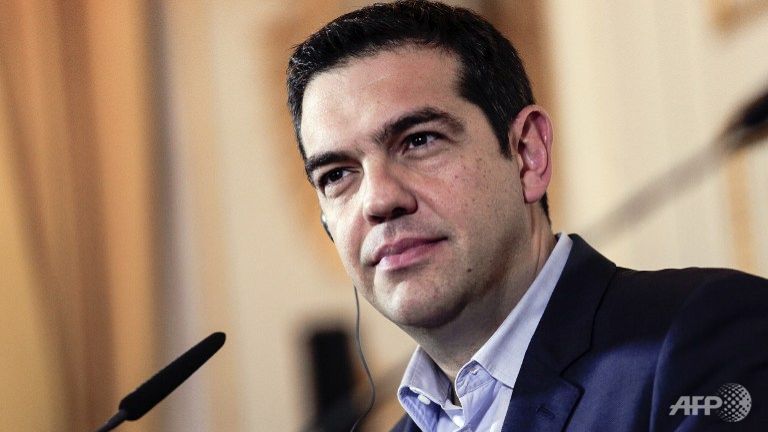Greece readies 10-point plan to win over sceptical creditors

File photo of Greek Prime Minister Alexis Tsipras. (Photo: AFP/Patrick Domingo)
ATHENS: Greece's new leftist government was fine-tuning a 10-point plan on Tuesday (Feb 10) in hopes of persuading its international creditors to rethink their "barbaric" bailout terms and prevent the country from crashing out of the eurozone.
Prime Minister Alexis Tsipras faced a confidence vote in parliament over his policies, but while he was expected to breeze through his first domestic political test, time to woo the holders of the purse strings was running out.
Tsipras is pushing for creditors to soften the tough conditions of the €240 billion (US$270 billion) bailout that Greece was forced to accept in the aftermath of the financial crisis, to boost its economy through spending.
At talks, kicking off with an emergency meeting of eurozone finance ministers on Wednesday, Greece will plead its case for stop-gap financing with a view to clinching a reform deal that will not exacerbate poverty, to run from Sep 1.
"After five years of bailout barbarity, our people can take no more disappointment," Tsipras said in a speech on Sunday.
Defence Minister Panos Kammenos warned that if negotiations with the eurozone fail, the country will go to a "Plan B", which could involve asking for funding from the United States, Russia or China.
Tsipras had appeared to rule out that idea last week, saying the government had "no other thoughts" than settling the matter with Europe - "at the moment".
'RISKS OF A MISSTEP GROWING'
According to a finance ministry source, the government is ready to cooperate on 70 per cent of its bailout obligations but wants to overhaul the remaining 30 per cent - which it would replace with the 10-step plan. It will offer a series of measures including lower primary surplus targets and cutting debt through a swap plan to replace its current EU-IMF bailout deal obligations..
The initiative was welcomed by the Greek market, which clawed back Monday's losses to rise more than 8.0 per cent, while the benchmark 10-year bond also recovered ground.
But while a steady performance on the European markets also suggested that the draft measures had soothed some jitters among investors, the continent's leaders were unlikely to be so easily swayed.
German Chancellor Angela Merkel has said she expects a "sustainable" finance plan that respects the "basic rules" of the bailout programme, while Britain moved Monday to draw up contingency plans for a Greek exit from the eurozone - dubbed a "Grexit". His chancellor of the exchequer George Osborne, in Istanbul at a G20 finance ministers meeting, told Bloomberg Television "the risks of a miscalculation or a misstep leading to a very bad outcome are growing."
While Greece's creditors want Athens to apply for an extension to the bailout - and stave off the risk of bankruptcy - the government wants a bridging loan to buy time for negotiations without the austerity shackles. The finance ministry source said such a deal could let both sides save face: "We call it a bridge. They can call it a technical extension."
Greece is under pressure to win approval for a new deal as quickly as possible because the European portion of the EU-IMF bailout is due to expire at the end of the month.
Tsipras will meet Angel Gurria, chairman of the Organisation of Economic Cooperation and Development, on Wednesday to polish the government's proposals a day before a full EU summit in Brussels on Thursday. A deal is not expected before a further eurozone financial ministers meeting next Monday at the earliest.
'PREPARED TO COMPROMISE'
But the proposals may fall at the first hurdle, as critics have pointed out that the European Stability Mechanism, which issues bailouts, is not set up to offer short-term loans. And fears persist that even if it comes through on the European tranche, Athens could run out of money before the summer because of a drop in tax revenues, leaving it unable to meet its IMF loan repayment.
Garry Jenkins, LNG Capital analyst, said the eurozone may view Tsipras's vow not to back down as being for his domestic audience "and that behind closed doors the Greek government will be prepared to compromise".
"However it is very unlikely that Merkel will be prepared to allow the Greek government to set the economic policy for the eurozone as a whole: the probability of her changing course 180 degrees is remote," he said.
Tsipras's legislative programme will go to a vote at midnight Tuesday in parliament, where the new prime minister has a comfortable majority. His proposals, unveiled on Sunday, include raising the minimum wage, raising the taxable income threshold and ditching an unpopular property tax - all of which have been cheered by ordinary Greeks but raised eyebrows on the international stage.
What the stars mean:
★ Poor ★ ★ Promising ★★★ Good ★★★★ Very good ★★★★★ Exceptional
Latest News
More News
- Russian President congratulates Vietnamese Party leader during phone talks (January 25, 2026 | 09:58)
- Worldwide congratulations underscore confidence in Vietnam’s 14th Party Congress (January 23, 2026 | 09:02)
- Political parties, organisations, int’l friends send congratulations to 14th National Party Congress (January 22, 2026 | 09:33)
- 14th National Party Congress: Japanese media highlight Vietnam’s growth targets (January 21, 2026 | 09:46)
- 14th National Party Congress: Driving force for Vietnam to continue renewal, innovation, breakthroughs (January 21, 2026 | 09:42)
- Vietnam remains spiritual support for progressive forces: Colombian party leader (January 21, 2026 | 08:00)
- Int'l media provides large coverage of 14th National Party Congress's first working day (January 20, 2026 | 09:09)
- Vietnamese firms win top honours at ASEAN Digital Awards (January 16, 2026 | 16:45)
- ASEAN Digital Ministers' Meeting opens in Hanoi (January 15, 2026 | 15:33)
- ASEAN economies move up the global chip value chain (December 09, 2025 | 13:32)
















 Mobile Version
Mobile Version